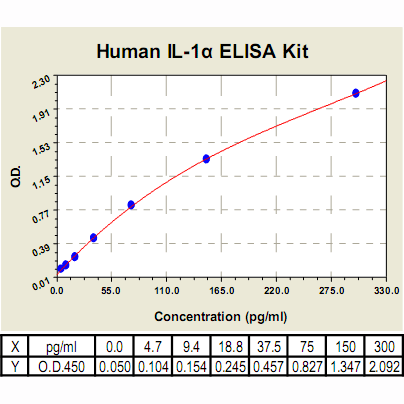IL-1α ELISA Kit, Human |
 |
BACKGROUND Interleukin-1 (IL-1) is the prototypic pro-inflammatory cytokine produced predominantly by activated monocytes and macrophages. There are two forms of IL-1, IL-1alpha and IL-1beta and in most studies, their biological activities are indistinguishable. IL-1beta is the dominant form of IL-1 in vivo. Both IL-1alpha and beta are derived by enzymatic cleavage of precursor proteins (pro-IL-1alpha and pro-IL-1beta).1 IL-1 affects nearly every cell type, often in concert with another pro-inflammatory cytokine, tumor necrosis factor (TNF). IL-1 plays a key role in the onset and development of the host reaction to invasion, being an important factor in the initiation of the inflammatory response and in the triggering of immune functions.2 Although IL-1 can upregulate host defenses and function as an immunoadjuvant, IL-1 is a highly inflammatory cytokine. The margin between clinical benefit and unacceptable toxicity in humans is exceedingly narrow.3 Due to its pleiotropic activity and to the high potency of its inflammatory effects, IL-1 activity is tightly regulated in the body by a complex network of control systems. These include the presence of two types of inhibitors, the receptor antagonist IL-1ra and the second type of IL-1 receptor (IL-1RI), which is a natural scavenger of IL-1. Furthermore, regulation of IL-1 activity is attained by a strict hierarchy of binding affinity of the two receptors (the activating IL-1RI and the inhibitory IL-1RII) for the various members of the IL-1 family. Additional levels of control are represented by the presence of soluble forms of both receptors and of immature pro-IL-1 forms with different characteristics of activity and receptor binding capacity.4
REFERENCES
1. Dinarello, C.A.: Int Rev Immunol. 16:457-99, 1998
2. Pantschenko, A.G.: Int J Oncol. 23:269-84, 2003
3. Arend, W.P.: Cytokine Growth Factor Rev. 13:323-40, 2002
4. Boraschi, D. et al: Front Biosci. 1:d270-308, 1996
2. Pantschenko, A.G.: Int J Oncol. 23:269-84, 2003
3. Arend, W.P.: Cytokine Growth Factor Rev. 13:323-40, 2002
4. Boraschi, D. et al: Front Biosci. 1:d270-308, 1996
Products are for research use only. They are not intended for human, animal, or diagnostic applications.
Параметры
Cat.No.: | CL0389 |
Target Protein Species: | Human |
Range: | 4.7 pg/ml – 300pg/ml |
Specificity: | No detectable cross-reactivity with other cytokines |
Storage: | Store at 4°C. Use within 6 months. |
ELISA Kits are based on standard sandwich enzyme-linked immunosorbent assay technology. Freshly prepared standards, samples, and solutions are recommended for best results.
Документы
Информация представлена исключительно в ознакомительных целях и ни при каких условиях не является публичной офертой








